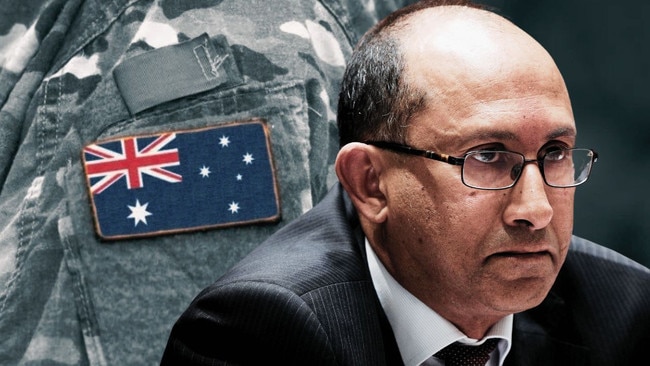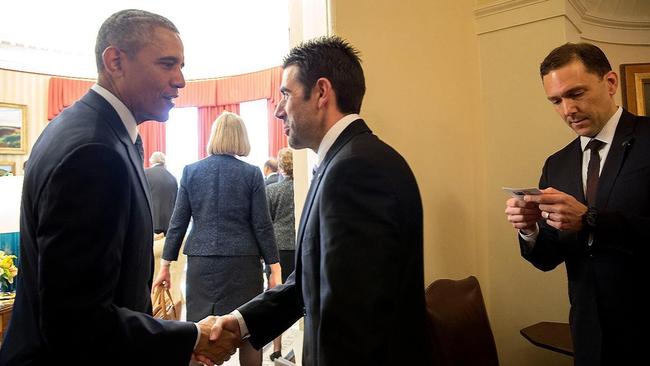Labor’s think tank review to ‘clamp down on Australian Strategic Policy Institute’
One of Australia’s top strategic think tanks has warned that the government is preparing to nobble the organisation following a review that will allow its funding to be slashed if it doesn’t toe the line.

One of Australia’s top strategic think tanks has warned that the government is preparing to nobble the organisation following a review that will hand bureaucrats control of its research agenda and allow its funding to be slashed if it doesn’t toe the line.
Australian Strategic Policy Institute executive director Justin Bassi levelled the charge after being briefed by former Department of Foreign Affairs secretary Peter Varghese on the findings of his controversial inquiry into funding for strategic policy work.
Mr Bassi said his suspicions had been confirmed that the review was “an effort to clamp down on ASPI”, which had been singled out by Beijing for its hawkish views on China.
Under the Varghese blueprint, to be released publicly this week, the heads of national security departments and agencies would determine think tanks’ research priorities. Those that received operational funding would have their existing allocations rolled over for the next two years before being forced to compete for five-year grants, in a move described by one think-tank source as “incredibly coercive”. The organisations would also face constant government scrutiny, with each required to provide an “observer” seat on their governing council for a senior bureaucrat.
Mr Bassi said the proposed changes, set to be given the green light by the government, would undermine think tanks’ ability to critique government policy.
“It sends a clear signal to all Australian national security think tanks that the government will exercise greater command and control over their work,” he said. “Every think tank will have to stop and ask themselves whether criticising the government or seriously challenging its national security agenda will affect their chances of receiving future funding.
“And that goes against the whole purpose of thinks tanks and contestability, which is to improve policy-making by challenging orthodoxies and the status quo.”

The government ordered the review in February as it sought to bed down its newly stabilised relationship with China, which criticised ASPI over its “anti-China” research in its 2020 list of “grievances” with Australia.
The think tank angered Beijing with deep dives into China’s use of Uighur slave labour, foreign-influence operations, and research collaborations between its military-linked universities and institutions in Australia and other Western countries. It has also been highly critical of the Australian government over the years, accusing it of underfunding Defence and mismanaging major procurements.
Opposition home affairs spokesman James Paterson warned the government that using the Varghese review to “clip ASPI’s wings” would mean “capitulating” to China’s demands. “This will have a chilling effect on all researchers working on the Chinese Communist Party and send the clear message your funding could be cut if you displease the Chinese government,” Senator Paterson said.
“While opening ASPI’s core funding to competitive tender might sound intuitively appealing, in reality this will shatter their financial security and put their viability on the line every five years. In turn this will undermine their independence … This completely undermines why the government established ASPI in the first place: to provide policy constestability.”
The proposed changes would affect a raft of think tanks that receive a combined $40m a year in public funding, including ASPI, the Lowy Institute, ANU’s National Security College, the US Studies Centre and the Australian American Leadership Dialogue. ASPI receives about $8m a year in government funding, including $4m in core support that would be at risk. It has also received an additional $5m over two years to set up an office in Washington that the organisation fears could be pulled. Senator Paterson warned closing ASPI’s US operation would be “particularly badly timed”, as the think tank had enjoyed good access and influence during the previous Trump administration.
Former ASPI executive director Peter Jennings said the review was an “unsubtle attempt to exercise control over what ASPI says and does”. “I think Labor is even more sensitive about negative commentary than the previous government,” he said. “The overall outcome will be a quelling of public commentary on defence and security which Canberra officialdom doesn’t like.”
He said the government “should be very careful it doesn’t deliver China a victory by reducing scope for think tanks to make public comment in Australia”.





To join the conversation, please log in. Don't have an account? Register
Join the conversation, you are commenting as Logout